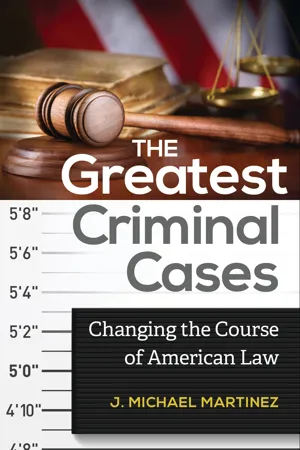
- 288 pages
- English
- PDF
- Available on iOS & Android
About This Book
This fascinating book recounts the compelling stories behind 14 of the most important criminal procedure cases in American legal history. Many constitutional protections that Americans take for granted today—the right to exclude illegally obtained evidence, the right to government-financed counsel, and the right to remain silent, among others—were not part of the original Bill of Rights, but were the result of criminal trials and judicial interpretations. The untold stories behind these cases reveal circumstances far more interesting than any legal dossier can evoke. Author J. Michael Martinez provides a brief introduction to the drama and intrigue behind 14 leading court cases in American law. This engaging text presents a short summary of high-profile legal proceedings from the late 19th century through recent times and includes key landmark cases in which the court established the parameters of probable cause for searches, the features of due process, and the legality of electronic surveillance. The work offers concise explanations and analysis of the facts as well as the lasting significance of the cases to criminal procedure.
Frequently asked questions
Information
Table of contents
- Cover
- Contents
- Introduction and Acknowledgments
- Chapter 1 Hurtado v. California (1884) and 19th-Century Criminal Procedure
- Chapter 2 Weeks v. United States (1914) and the Origins of the Exclusionary Rule
- Chapter 3 Olmstead v. United States (1928) and Wiretapping the “Baby Lieutenant”
- Chapter 4 Powell v. Alabama (1932) and the Scottsboro Boys
- Chapter 5 Brown v. Mississippi (1936) and Fundamental Fairness
- Chapter 6 Mapp v. Ohio (1961) and the Exclusionary Rule Redux
- Chapter 7 Gideon v. Wainwright (1963) and the Right to Counsel
- Chapter 8 Miranda v. Arizona (1966) and the Right to Remain Silent
- Chapter 9 Katz v. United States (1967) and the Right to Privacy
- Chapter 10 Terry v. Ohio (1968) and the Stop-and-Frisk Search
- Chapter 11 Chimel v. California (1969) and Searches Incident to Arrest
- Chapter 12 United States v. Leon (1984) and a Good Faith Exception to the Exclusionary Rule
- Chapter 13 California v. Hodari D. (1991) and Determining When a “Seizure” Occurs
- Chapter 14 Hamdan v. Rumsfeld (2006) and Trial by Jury
- Conclusion
- Bibliography
- Index